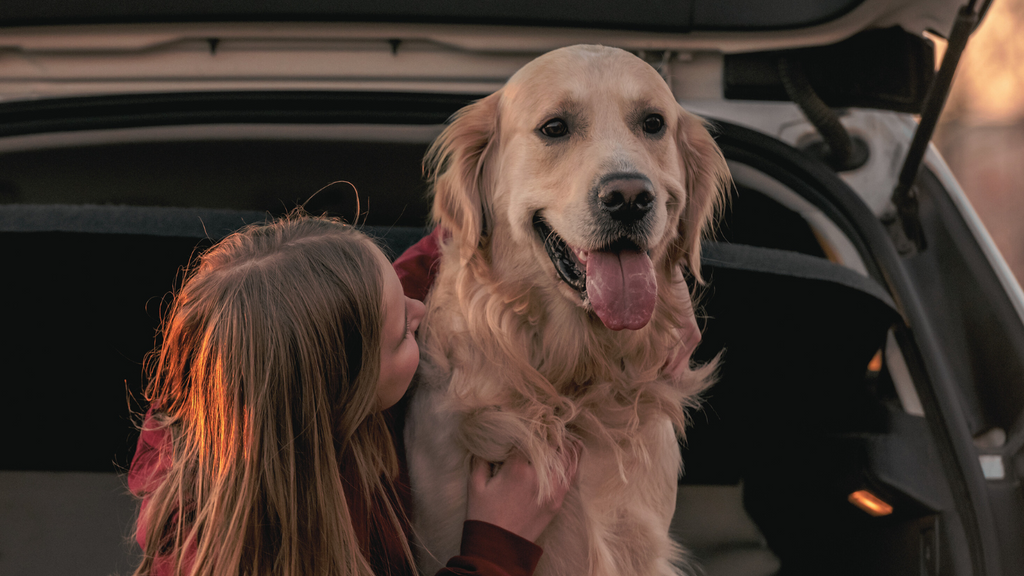
When Disaster Strikes: A Pet Owner's Evacuation Nightmare
"Daddy, Cooper's breathing funny," Emma whispered, watching their elderly Golden Retriever pace anxiously in the backseat. Their German Shepherd Luna whined softly, picking up on everyone's distress as Mike made what felt like the hundredth phone call from the gas station parking lot.
The hurricane evacuation order had come just hours ago, it’s getting dark, and every pet-friendly hotel within 200 miles was booked solid or would only accept small animals. Their aunt had offered to take in the family, but also has severe pet allergies, "Maybe the dogs could stay somewhere else?"
Cooper and Luna weren't just pets – they were family. These dogs had been there for every nightmare, every scraped knee, every celebration. Cooper's evening heart medication was overdue, and Mike caught his wife Sarah's worried glance. The prescription was sitting back home on the kitchen counter, forgotten in their panicked rush to leave. Tyler's small voice broke the tense silence: "What are we gonna do Dad? Is he going to be ok?"
His phone buzzed with another "sorry, no vacancies." The closest pet-friendly emergency shelter was three hours away, and they were only accepting pets with up-to-date vaccination records – which were sitting in a folder in his home office desk. "We'll figure this out," Mike promised his family, watching all four of his children – two human, two canine – huddled together in the backseat amongst whatever supplies they could grab. "We're staying together. No matter what."
When disaster strikes, every minute counts. While most of us have some kind of emergency plan for our human family members, we assume our four-legged (or winged, or scaled) friends will just tag along with us only to find out, its not that easy. With a little extra planning, you can ensure your pets safety as well.
Create a Pet Go-Bag:
Think of a pet emergency kit as a backup supply pack you can easily grab along with your people emergency kits.
The Basics
- A 7-day supply of food (Rotate supplies every few months to prevent expiration)
- Fresh water (1 gallon per pet per day just like humans)
- Collapsible food and water bowls for easy transport
- Any daily medications
- Pet first-aid supplies (ask your vet for specific recommendations)
Documentation (digital and/or physical copies)
- Current photos of your pet (including one with you in it)
- Vaccination records
- Medical history- copy of prescriptions
- Microchip information or other tracking devices
- License documentation
- Pet insurance papers (if applicable)
Comfort
- A secure carrier, leash LED collar, or reflective gear for nighttime visibility
- A blanket
- A familiar toy or two
- Treats (just like people, helps with stress)
- Portable habitats
- Species-specific environmental needs (heat lamps, etc.)
Hygiene & Sanitation
- Waste management supplies (poop bags, litter, portable litter box)
- Grooming basics
- Pet wipes for quick cleanup
Finding Pet-Friendly Shelters
Don't wait until an evacuation order to figure out where you'll go. Keep a current list of:
- Pet-friendly hotels within a 100-mile radius
- 24-hour emergency vet clinics along potential evacuation routes
- Pet boarding facilities that offer emergency services
- Friends or family willing to take in your pets temporarily, with or without you.
Keeping Your Pet Calm in Crisis
Animals are incredibly perceptive to environmental changes and our own stress levels.
- Maintain routines as much as possible during emergencies
- Create a safe space in your emergency location
- Consider anxiety or vet-approved calming products
- Stay calm yourself—your pet will pick up on your energy
Emergency preparedness for pets isn't just about having supplies—it's about peace of mind. When you know you've planned for your entire family's safety, including your pets, you can face unexpected situations with confidence and get all to a safe location.
Take time now to prepare, so you never have to make a hard choice. Remember: Your pet relies on you entirely for their safety and survival.
Tags
- All
- 25 year food
- 25 year shelf life food
- 72 hour kit
- Best food storage types
- Best long-term food storage
- Blizzard preparedness
- Budgeting
- canning
- Certified GMO-free Emergency foods
- Certified GMO-free foods
- Coffee
- Comparison of emergency food methods
- Composting tips
- Dangers of genetically modified foods
- dehydrated food
- Edible Wild Plants
- emergcy preparedness
- Emergency Cooking
- Emergency Food
- Emergency food Christmas gifts
- emergency food storage
- Emergency Food Supply
- Emergency food supply recommendations
- Emergency Planning
- Emergency Preparedness
- Emergency preparedness advice
- emergency preparednesss
- Emergency Supplies
- Emergency supplies checklist
- Emergency Survival
- emergency survival gear
- Emergency survival kit checklist
- Emergency Survival skills
- exercise
- Family emergency preparedness
- Family emergency preparedness plan
- Family Preparedness
- Food Storage
- Food storage 25 year shelf life
- Food storage amounts
- Food storage Christmas
- Food storage containers long term
- Food Storage Secrets
- Food storage serving size
- Food storage types compared
- freeze dried food
- Freeze dried food storage
- freeze dried meats
- Freeze-dried emergency food storage
- Fruit Trees
- Gardening
- Getting Started
- Gluten-free food Storage
- Gourmet emergency food
- Healthy food storage
- How much emergency food to store
- Improved emergency preparedness
- Jared Markin
- Jared Matkin
- Legacy Premium
- Lessons learned from Hurricane Sandy
- Lessons learned from natural disasters
- long-term food storage
- Long-term Food Storage Guidelines
- Long-term Food Storage tips
- Long-term water storage
- Mental Emergency Preparedness
- Mental toughness
- Money-saving tips
- Natural disaster planning
- Natural Disasters
- Perfect Christmas gifts
- Pet Emergency preparedness checklist
- Pet Emergency preparedness kit
- Pet Emergency Survival tips
- Pets and Emergency Preparedness
- Plant Foraging
- portable solar panels
- portable solar power
- portable water filters
- protein drinks
- Risk of genetic modification
- Seed saving and storage
- Seed saving guide
- Self-reliance
- Self-reliant practices
- Shelf Life
- Solar Cooking
- Solar Ovens
- Special Dietary needs
- Stranded in a car in a blizzard
- Survival food
- Survival Gear
- survival kit
- Survival kits
- Survival Ovens
- Survival Skills
- survivalist gear
- suvival kit
- Tree Pruning tips
- Tree Trimming basics
- unique ideas
- water bottle with filter
- water filter
- water filter straw
- water filters
- Water Filtration
- water pitcher with filter
- water pitchers with filters
- Water purification
- Wild Food Foraging
- Winter composting
- Winter driving
- Winter preparedness tips
- Winter storm preparedness tips
- Winter Survival







